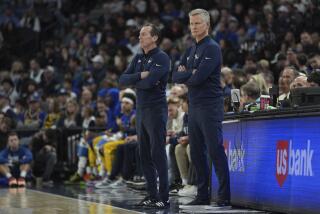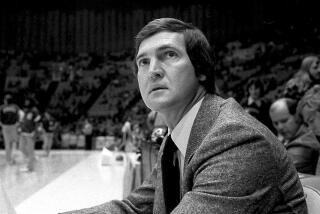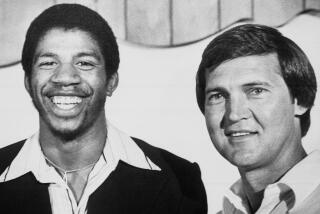A Ringing Endorsement
- Share via
Now for the Phil Jackson Era, otherwise known as Zen and the Art of Modern Psycho Maintenance.
It’s going to be a new world for the young Lakers, even if it may seem less like basketball than a survey course on Eastern and Native American spiritualism.
Jackson’s Bulls used to meet in a special room adorned by a wooden arrow with a tobacco pouch dangling from it, a Lakota Sioux symbol of prayer; a bear-claw necklace, which was supposed to confer power and wisdom upon its beholder; a painting of Crazy Horse and photos of a white buffalo, a symbol of prosperity and fortune. In his book, “Sacred Hoops,” Jackson called it “the perfect setting for an epiphany.”
Great. First of all, the Laker kids are going to have to learn what an “epiphany” is.
According to the dictionary, it’s a “moment of sudden intuitive understanding.” Any understanding would be welcome in Lakerdom, where the team has blown up spectacularly in four successive postseasons, amid much finger-pointing and coach-devouring.
If the truth be known, Jackson’s philosophical journey meant less to the Bulls than his other gifts, which were less reminiscent of Eastern mystics or Great Plains chiefs than the great Italian kidder, Niccolo Machiavelli.
Jackson was always giving his players books to read, lessons to remember and sights to see, which they treated like voluntary homework from a kooky favorite teacher.
Once, on a bus from Houston to San Antonio--the coach occasionally booked ground transportation so they could see the country, in this case more than 100 miles of featureless prairie--he gave them a psychological test, passing out sheets of paper with a circle on it, which was supposed to represent the team. In it, they were to place a dot, corresponding to their idea of their proper place. Stacey King made a hat out of his. Several players folded them into paper airplanes and sailed them up toward the front. Michael Jordan crumpled his up.
All in all, this stuff made Jackson easy to profile, or caricature by skeptics, who thought Jordan was conferring a lot more of the power and wisdom than any bear claw necklace. After Jackson wrote “Sacred Hoops” in 1995, Jeff Van Gundy, coach of the hated Knicks, called him “Big Chief Triangle.”
“Our biggest concern in the off-season,” noted Van Gundy, “was to find as many Indian artifacts as we could.”
Not that this lore lent to a better understanding of Jackson. As Charlie Rosen, his collaborator on his first book, “Maverick,” once said, “This is all just a way for the media to put him in a box, to contain him.”
It wasn’t the artifacts in the meeting room but the man who put them up. Before Jackson took over, the Bulls were talented but fractured. When they lost, the entire roster could feel the weight of Jordan’s scorn.
Jackson knit them together, using their own foibles against them, letting them know that whenever they embarrassed and exposed themselves, they’d be welcomed back into the bosom of the team, the one place they were safe.
The Chicago Sun-Times’ Jay Mariotti once accused Jackson of being a source for Sam Smith’s “The Jordan Rules,” which first jogged Jordan’s halo. Jackson even did his dangle-and-rescue trick in public the night Scottie Pippen took himself out of a playoff game against the Knicks, upset Jackson was running the last play for Toni Kukoc.
Minutes after Kukoc hit the game-winning shot, Jackson strode into the interview room in the dank basement of Chicago Stadium and, instead of inventing an injury for Pippen, as most coaches would have, mentioned what happened before anyone even asked where Scottie had been.
After the predictable firestorm, a repentant Pippen returned two days later with 25 points, eight rebounds and six assists in another Bull victory.
Said Jackson: “Sometimes you grow closer out of the things that happen to ball clubs and individuals, to bring them together even closer. Tension brings weird experiences to people.”
And, in their case, six NBA titles.
The Kid From Left Field
Not that you’d expect the son of a Pentecostal minister, whose mother had been a traveling evangelist, born in the wilds of Montana, to grow up to be your ordinary NBA coach, or any kind of NBA coach.
For the first four years of Phil’s life, they lived in the basement of a church before his father, Charles, got an offer from Williston, N.D. Charles consulted his wife, Elisabeth, and three sons, who said they preferred green, scenic Montana to the barren Dakota plains. Typically, notes David Halberstam, recounting the story in his book, “Playing for Keeps,” Charles decided God wanted him to move to Williston.
The Jackson boys were raised in a strict piety, forbidden to dance, read comic books, listen to rock ‘n’ roll or watch television.
“We were taught to believe that the apocalyptic vision in the Book of Revelations was about to be fulfilled any minute and if we weren’t prepared, we’d be left out when Christ returned and gathered up his saints,” Jackson wrote in “Sacred Hoops.”
“As a little boy, I was terrified of being excluded from the ‘rapture of the saints’ and losing my parents. One day my mother wasn’t there when I returned from school and I got so frightened that the rapture had started without me that I ran all over town looking for her. I was shaking when I finally tracked her down at a local radio station, taping a religious program with my dad.”
Phil didn’t rebel outright--that was older brother Joe, although he eventually came around--and he seemed always to bear his parent’s basic values, but in a markedly different form and structure.
Children were expected to experience a call from God, but Phil’s never came. He spent three years, asking for forgiveness, noting the hurt looks his mother gave, until at age 15, he decided it wasn’t coming.
Instead, he dove into basketball.
He was 6 feet 6 when he left Williston High, recruited to the University of North Dakota by the new coach, Bill Fitch. Jackson grew to 6-8, led his team to the College Division finals in his last two seasons and became a second-round pick of the Knicks. He also discovered movies, was married and graduated with a composite degree in philosophy, psychology and religion. Wherever he was going, he was headed there in a hurry.
In New York, improbably enough, he became a fan favorite, the Knicks’ house freak. Fitch, visiting his former straight arrow at his Greenwich Village apartment, says he found him “with hair down to his shoulders. . . . not a hippie but a super-hippie.”
Not on the court. Jackson was a rawboned forward with coat hanger shoulders and menacing elbows whose zeal kept him in New York for 10 years, high times indeed. The Knicks won titles in 1970 and 1973. Jackson, his marriage over, dropped LSD on the beach in Los Angeles with a Hollywood actress and wrote about it in “Maverick.”
He also formed an improbable bond with Coach Red Holzman, an Old School, un-hip kind of guy, who nonetheless discovered his free-spirit had a probing basketball mind. Holzman used to send him out to scout and finally asked him if he was interested in coaching one day.
Jackson said no. What flower child ever thought about becoming management?
Nevertheless, a year after retiring and moving back to Montana, he missed the game enough to accept a job coaching the CBA’s Albany Patroons, and moved his new family to nearby Woodstock, N.Y.
He won a CBA title in 1984. A year later, Bull General Manager Jerry Krause, who had scouted Jackson in college and maintained a friendship with him, got him an interview with his new coach, Stan Albeck. Jackson showed up wearing a Panama hat with a flowing macaw feather and there went that gig.
Two years later, Krause got him an interview with his new coach, Doug Collins. This time, suggested Krause, bag the hat. Jackson did and got the job.
So began three tumultuous seasons. The Bulls had the young Jordan and an assured future but there seemed to be a certain volatility built in. Krause had a habit of scouting for his next coach even as his incumbent worked, a gesture the incumbent never fully appreciated.
So Krause turned from Albeck to Collins. Then one day, Krause happened to mention to a reporter that Jackson, the lowliest of their three assistants, would make a great coach. Collins was a fine coach but a Vesuvius of emotion and there went that relationship. Fearing Jackson was a spy, traitor or both, Collins once went on a weeks-long snit in which he wouldn’t talk to Jackson except in timeout huddles.
Then Collins was fired in 1989 and Krause moved up his protege. Chicago reporters, tired of braving Collins’ moods, rejoiced. Jackson was so easy-going, they thought.
Of course, what did they know?
It Wasn’t Exactly Age of Aquarius
It didn’t turn out to be a festival of peace, love and music, although they did enjoy some success.
Jackson had several problems, starting with getting Jordan to trust and stop torturing his teammates, starting with Pippen and Horace Grant. He had to get Jordan to accept assistant coach Tex Winter’s triangle, which Jordan, who had a string of scoring titles going, sniffed, was an “equal-opportunity offense.”
(Winter, a bulldog, had classic go-rounds with Jordan, as when he reminded him, “There’s no I in team.” Responded Jordan: “But there is in win.”)
In time, the Bulls’ execution of their half-court offense made them a rare ballet in an otherwise mechanical NBA, even if skeptics in Chicago still joked the triangle really meant “three ways to get the ball to Jordan.”
In Jackson’s second season, they won the first of three consecutive titles, after which Jordan retired. Then, after Jordan came back, they won three more in a row.
It should have been paradise, but it wasn’t.
If Jackson needed unifying principles, he didn’t have far to look. In a sports-mad city that prided itself on its lovable losers and barely could imagine a winner, much less a dynasty headed by a movie idol/superstar, enthusiasm turned into hysteria until the team was besieged by adoration.
That was the external threat. Internally, there was the front office.
Fault lines were already showing in the spring of 1996 as they finished their record 72-10 season and romped to a title. In the 18 months that Jordan had been gone, there had been almost open warfare between the players and Krause, resulting in Grant’s departure and the alienation of his best friend on the team, Pippen. The return of Jordan, who had never hidden his contempt for Krause, didn’t heal any breaches.
Once a scrub, Will Perdue, even ripped Krause in a diary he wrote for the Daily Southtown: “It seems most GMs stay away from the spotlight and work behind the scenes, but not Jerry. When the players know that Big Brother is watching, it puts more pressure on them. . . . Even when we win, the guy is never in a good mood.”
What “the guy” and his boss, owner Jerry Reinsdorf, really had in mind was another title, after which Jordan would presumably retire, and then a quick rebuilding program so they could be on their way back by the time the leases on their luxury suites ran out in 1999.
Jackson, caught in the middle, began leaning inevitably toward the players. Finally, opening negotiations for a new contract during the ’96 playoffs, he asked that Krause’s office be moved out of the Bulls’ training facility.
Reinsdorf backed Krause. After that, Jackson and Jordan worked on one-year contracts, neither willing to commit himself longer.
Not that Krause took it badly, but in the spring of ‘97, when Jackson was again approaching free agency, the general manager barred the coach from the facility while they were working out a prospective draftee, Tracy McGrady.
At the bottom, it was all about control and credit. Halberstam recounts the story of Billy Packer, who was doing a book on coaching philosophies, calling Krause to get Jackson’s number, only to be upbraided by Krause for focusing on the coach rather than the general manager.
Krause even drew down on Jordan, blurting during their final training camp together, “Players don’t win titles. Organizations do.”
Whoever it was, Jordan, the Bulls or the organization, won one more and decided to call it a dynasty. Jackson sat out this short season and might have sat out another, until his dream job opened up.
The Lakers may not win six titles under him, or even one, but it looks like a good fit. After what they’ve been through, he looks like a knight on a white horse. After what he has been through, they look like a sea cruise.
More to Read
Go beyond the scoreboard
Get the latest on L.A.'s teams in the daily Sports Report newsletter.
You may occasionally receive promotional content from the Los Angeles Times.










